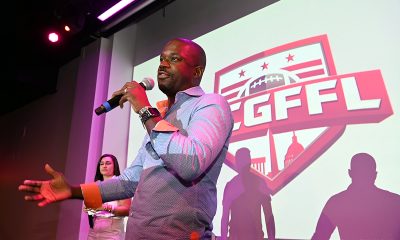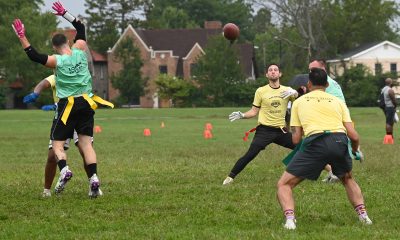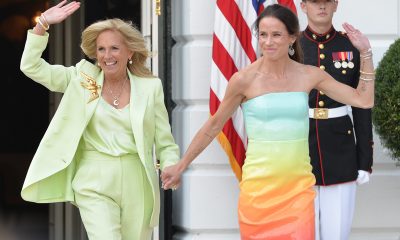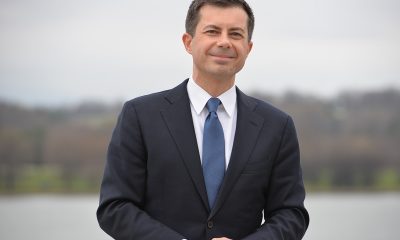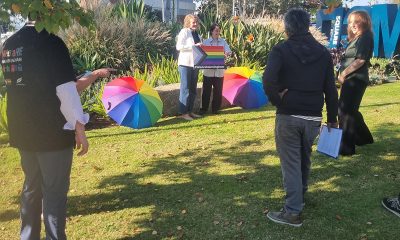Sports
D.C. Gay Flag Football League regrouping as participation dips
Popular gay sports outfit rethinking strategy for upcoming 19th season
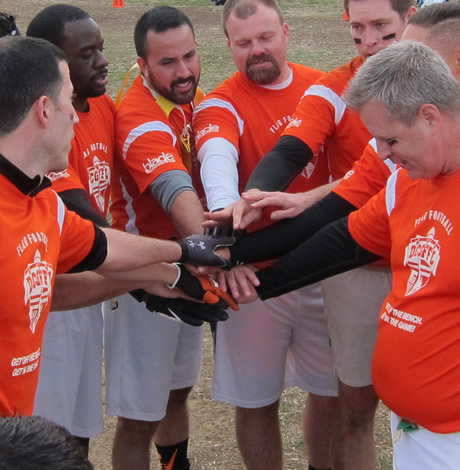
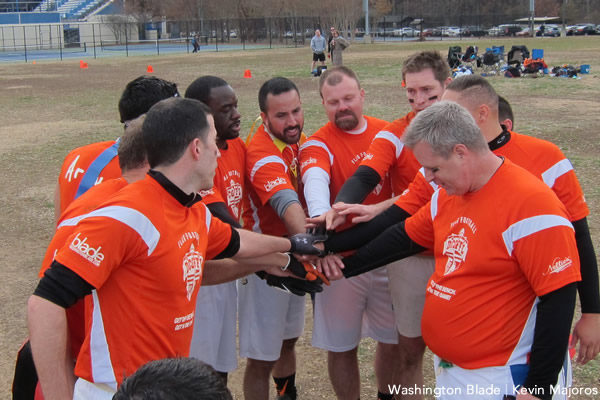
With upwards of 40 LGBT sports teams and leagues in existence, Washington has a thriving sports community that continues to grow each year. While there are many players who compete in multiple sports at the same time, it’s also common for players to migrate from sport to sport.
A swimmer might feel burned out in the pool and decide to try rugby. A softball player might be too injured to play ball and moves over to the dart league. A sport that meets multiple times per week might be too time consuming for the player who switches to a sport that’s only held once a week.
There are a lot of factors at play, but the end result is ebbs and flows in the athlete numbers that each team or league can maintain. A league with a waiting list can become a league with low numbers and vice versa.
The good news is that the LGBT sports community continues to flourish, just not in a way that every team or league can count on.
In the mid-1990s, there was a group of flag football players meeting weekly at Francis Field and a group playing near the Washington Monument. In 1998, the groups came together and the beginnings of the D.C. Gay Flag Football League were set in motion.
After building for a few seasons, the league consistently had 20 teams playing, sometimes 22. Last spring, for the first time since 2011, it dropped to 14 teams.
They had evolved over the years to keep the league fresh, so the drop was unexpected. With so many factors at play, league leadership was unsure of what caused the decline. They have ideas on pulling their numbers back up.
“We were consistently pulling in 60 new players each season and we didn’t hit that number this past spring,” says league Commissioner Brandon Waggoner. “Quarterbacks are a leadership role for each team, and we have a hard time maintaining the head count for that position.”
League leadership is hoping to engage some tactics for its upcoming 19th season and beyond. That will include recruiting events, attracting new sponsors, changes in their social event locations and changes to their player draft. One big change they’re gunning for is a change of venue for league play.
The league has been playing at the Carter Barron fields since its inception. Last week, the fields at Carter Barron were used as a parking lot for the Citi Open tennis tournament. As in previous years, the league will do maintenance on the fields to have them in shape by the time its season starts this fall.
The new location members are targeting is the much-coveted fields that have just opened at RFK. The Fields at RFK Campus include three multi-purpose turf fields to accommodate kickball, soccer, lacrosse, baseball, softball and more.
There are a whole lot of teams and leagues (straight, LGBT, youth) vying for those permits. The daily operations of The Fields are being managed by Capitol Riverside Youth Sports Park. Several entities such as D.C. Fray, Capitol Hill Little League and District Sports have already secured spots.
In the meantime, the league is looking to its future in an attempt to even out numbers.
“We are going to be paying attention to all the details and bring a fresh perspective,” says JJ Johnson, the league’s director of operations. “We want to reach a higher level of competition and better game-day experience. This is a big job and we will continue to do it well.”
“I love our league and the journey that we have been on,” Waggoner says. “I was around for the beginning and I am happy to back in a leadership position that will take us to our 20th season in 2020.”
Sports
English soccer bans transgender women from women’s teams
British Supreme Court last month ruled legal definition of woman limited to ‘biological women’

The organization that governs English soccer on Thursday announced it will no longer allow transgender women to play on women’s teams.
The British Supreme Court on April 16 ruled the legal definition of a woman is limited to “biological women” and does not include trans women. The Football Association’s announcement, which cites the ruling, notes its new policy will take effect on June 1.
“As the governing body of the national sport, our role is to make football accessible to as many people as possible, operating within the law and international football policy defined by UEFA (Union of European Football Associations) and FIFA,” said the Football Association in a statement that announced the policy change. “Our current policy, which allows transgender women to participate in the women’s game, was based on this principle and supported by expert legal advice.”
“This is a complex subject, and our position has always been that if there was a material change in law, science, or the operation of the policy in grassroots football then we would review it and change it if necessary,” added the Football Association.
The Football Association also acknowledged the new policy “will be difficult for people who simply want to play the game they love in the gender by which they identify.”
“We are contacting the registered transgender women currently playing to explain the changes and how they can continue to stay involved in the game,” it said.
The Football Association told the BBC there were “fewer than 30 transgender women registered among millions of amateur players” and there are “no registered transgender women in the professional game” in England, Scotland, Wales, and Northern Ireland.
The Scottish Football Association, which governs soccer in Scotland, is expected to also ban trans women from women’s teams.

FIFA has announced Saudi Arabia will host the 2034 World Cup, despite concerns over its human rights record that includes the death penalty for homosexuality.
The Associated Press reported FIFA confirmed the decision on Dec. 18. The AP noted Saudi Arabia is the only country that bid to host the 2034 World Cup.
“This is a historic moment for Saudi Arabia and a dream come true for all our 32 million people who simply love the game,” said Sport Minister Prince Abdulaziz bin Turki Al- Faisal, who is also president of the Saudi Olympic and Paralympic Committee, in a statement the Saudi Press Agency posted to its website.
Saudi Arabia is among the handful of countries in which consensual same-sex sexual relations remain punishable by death.
A U.S. intelligence report concluded Saudi Crown Prince Mohammed bin Salman “likely approved” the murder of Jamal Khashoggi, a Washington Post columnist, inside the Saudi Consulate in Istanbul in 2018. A federal judge in 2022 dismissed a lawsuit against Prince Mohammed after the Biden-Harris administration said he was immune to the lawsuit because he is the country’s prime minister.
Human rights activists have also criticized the Saudi government over the treatment of women, migrant workers, and other groups in the country.
“No one should be surprised by this,” Cyd Zeigler, Jr., co-founder of Outsports.com, an LGBTQ sports website, told the Washington Blade in an email after FIFA confirmed Saudi Arabia will host the 2034 World Cup. “FIFA, the International Olympic Committee, and many other world governing bodies routinely turn to authoritarian countries with terrible human-rights records to host major sporting events. There are simply few other countries willing to spend the billions of dollars it takes to build the needed infrastructure.”
Peter Tatchell, a long-time LGBTQ activist from the U.K. who is director of the Peter Tatchell Foundation, in a statement described FIFA’s decision as “a betrayal of the values that football should stand for: Inclusivity, fairness, and respect for human rights.”
“This is not about football; it’s about sportswashing,” said Tatchell. “The Saudi regime is using the World Cup to launder its international image and distract from its brutal abuses. By granting them this platform, FIFA is complicit in whitewashing their crimes.”
Qatar, which borders Saudi Arabia, hosted the 2022 World Cup.
Consensual same-sex sexual relations remain criminalized in Qatar.
“Saudi Arabia was the only country to bid for the 2034 FIFA World Cup,” said Zeigler. “So, until FIFA, the IOC (International Olympic Committee) and other governing bodies ban major human-rights violators from hosting, we’ll continue to see events like this in Saudi Arabia, China, Qatar, and other countries with terrible LGBTQ rights issues.”
The Blade has reached out to FIFA and the Saudi government for comment.
Sports
Controversy grows over member of Calif. university’s women’s volleyball team
Coach suspended, NCAA sued, more rivals forfeit
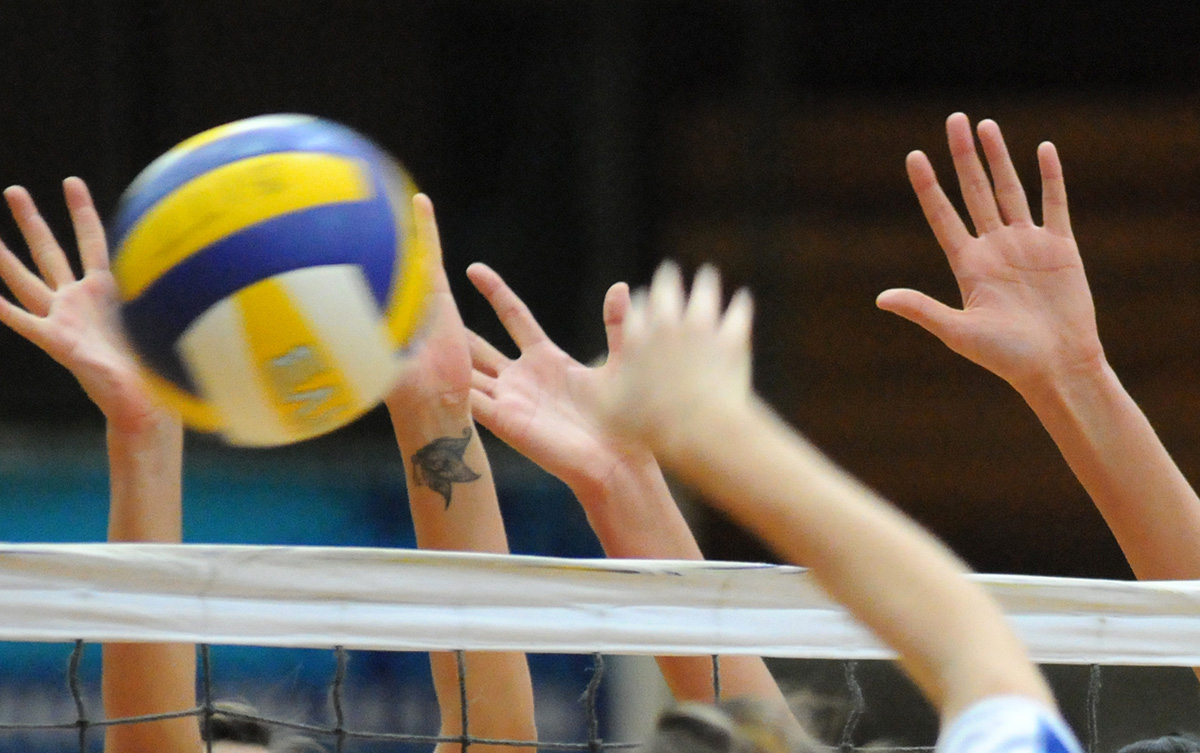
San Jose State University’s women volleyball team has collected yet another W by forfeit — its seventh so far this season — as controversy swirls around one player on its roster. She’s one of the seniors, and she has been dragged in the media by her own co-captain, who outed her as transgender.
The Washington Blade is not naming this student athlete since neither she nor the school have confirmed or even commented on her gender identity.
SJSU visited San Diego last weekend for a match before the Aztecs’ biggest home crowd of the season — including protesters waving “Save Women’s Sports” banners and booing one player on the Spartans team in particular: The woman who is reported to be trans.
Security was tight, with metal detectors and extra guards and police officers present. Video posted to YouTube by a right-wing sports media site — which names the player — shows an angry fan arguing with security about his First Amendment rights.
Video recorded during Nov. 9’s game shows a player for San Diego was injured following a spike by the player rumored to be trans, and had to be helped off the court. However, the video clearly shows that player was injured by landing poorly on one foot, not as a result of the spike.
The Aztecs defeated the Spartans 3-1, but San Jose has still punched its ticket to the conference finals, thanks to its record number of forfeits.
Wyoming was set to visit SJSU Thursday, but for the second time is joining other universities that have forfeited games against the Spartans, all without providing a reason. Boise State announced it will forfeit an upcoming match set for Nov. 21, its second forfeit against SJSU.
In September, the Spartans’ co-captain, senior Brooke Slusser, outed her own teammate, the player at the center of this controversy, in joining a federal lawsuit against the NCAA spearheaded by anti-trans inclusion activist and former college athlete Riley Gaines.
Slusser said in the lawsuit and in subsequent interviews that the player in question shouldn’t be on her team. The suit claims the NCAA’s policy on trans athletes violates Title IX by allowing “men” to compete in women’s sports and use women’s locker rooms where they display “full male genitalia.”
The NCAA policy for trans athletes participating in women’s volleyball aligns with that of USA Volleyball, which requires trans female athletes to suppress their testosterone below 10 nmol/L for a period of one year before competition. That is also how the NCAA determines eligibility. SJSU has stated repeatedly that all its players are eligible.
The lawsuit also asks the NCAA to revoke any titles or records won by trans female athletes in women’s competitions, which seems to be specifically aimed at stripping out trans NCAA champions Lia Thomas and CeCé Telfer of their titles in swimming and track and field, respectively.
Prior to this season, the player rumored to be trans did not attract any attention other than being a successful starter, like Slusser. But now that she is in the media spotlight, Slusser has come forward to tell right wing media, including Megyn Kelly, why she feels another woman two inches taller than she is poses a danger.
“I don’t feel safe,” Slusser said on “The Megyn Kelly Show” last month. “I’ve gone to my coaches and said I refuse to play against [her] … It’s not safe.”
In the video, both Kelly and Slusser refer to the player as “him” and a “man,” and name her.
Now comes another twist: San Jose State University suspended associate head coach Melissa Batie-Smoose with pay, indefinitely, after she filed a Title IX complaint against SJSU. She claims the player Slusser identified as trans conspired with an opponent to help the team lose a match and injure Slusser. Batie-Smoose named the player in question in her complaint and on Sept. 23, joined the same lawsuit that Slusser is now a part of.
“Safety is being taken away from women,” Batie-Smoose told Fox News. “Fair play is taken away from women. We need more and more people to do this and fight this fight because women’s sports, as we know it right now will be forever changed.”
Media reporting on the suspension, including Fox News, continue to name the athlete in question, with some also reporting what they say is the athlete’s birth name.
San Jose State released a statement following the suspension of Batie-Smoose: “The associate head coach of the San Jose State University women’s volleyball team is not with the team at this time, and we will not provide further information on this matter,” the team said.
SJSU Coach Todd Kress told ESPN that reports saying that any member of the Spartans colluded with their opponent are “littered with lies.”
The Spartans are currently among the top six finishers in the Mountain West Conference that will qualify to compete in the conference tournament scheduled for Nov. 27-30.



